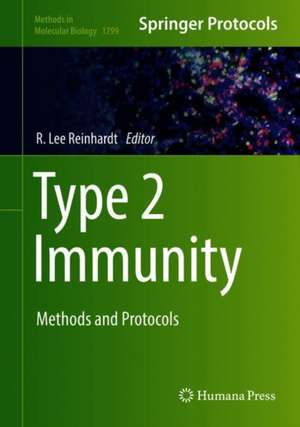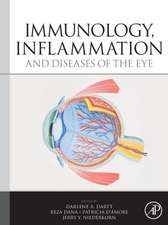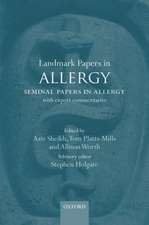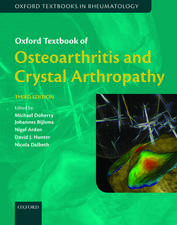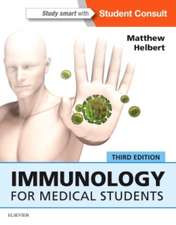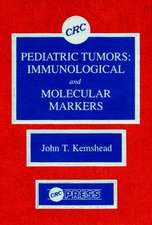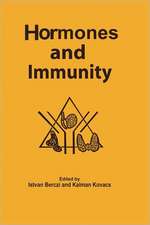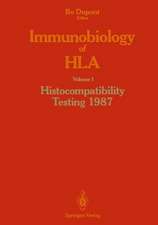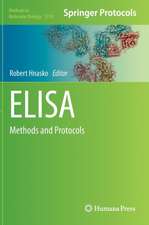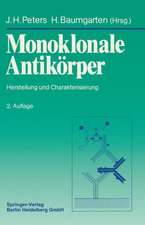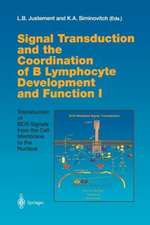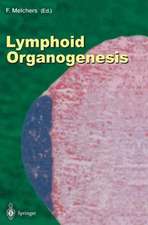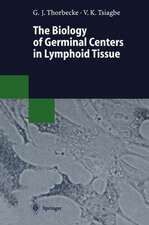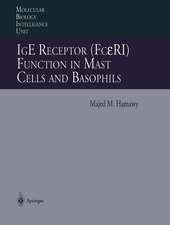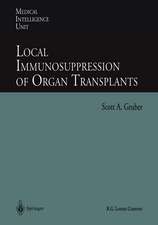Type 2 Immunity: Methods and Protocols: Methods in Molecular Biology, cartea 1799
Editat de R. Lee Reinhardten Limba Engleză Hardback – 29 iun 2018
Vital and authoritative, Type 2 Immunity: Methods and Protocols aims to provide a broad network of methods that can be used to develop a hypothesis and investigate its potential from bench to beside.
| Toate formatele și edițiile | Preț | Express |
|---|---|---|
| Paperback (1) | 735.78 lei 38-44 zile | |
| Springer – 10 dec 2019 | 735.78 lei 38-44 zile | |
| Hardback (1) | 1117.82 lei 43-57 zile | |
| Springer – 29 iun 2018 | 1117.82 lei 43-57 zile |
Din seria Methods in Molecular Biology
- 9%
 Preț: 791.63 lei
Preț: 791.63 lei - 23%
 Preț: 598.58 lei
Preț: 598.58 lei - 20%
 Preț: 882.98 lei
Preț: 882.98 lei -
 Preț: 252.05 lei
Preț: 252.05 lei - 5%
 Preț: 802.70 lei
Preț: 802.70 lei - 5%
 Preț: 729.61 lei
Preț: 729.61 lei - 5%
 Preț: 731.43 lei
Preț: 731.43 lei - 5%
 Preț: 741.30 lei
Preț: 741.30 lei - 5%
 Preț: 747.16 lei
Preț: 747.16 lei - 15%
 Preț: 663.45 lei
Preț: 663.45 lei - 18%
 Preț: 1025.34 lei
Preț: 1025.34 lei - 5%
 Preț: 734.57 lei
Preț: 734.57 lei - 18%
 Preț: 914.20 lei
Preț: 914.20 lei - 15%
 Preț: 664.61 lei
Preț: 664.61 lei - 15%
 Preț: 654.12 lei
Preț: 654.12 lei - 18%
 Preț: 1414.74 lei
Preț: 1414.74 lei - 5%
 Preț: 742.60 lei
Preț: 742.60 lei - 20%
 Preț: 821.65 lei
Preț: 821.65 lei - 18%
 Preț: 972.30 lei
Preț: 972.30 lei - 15%
 Preț: 660.49 lei
Preț: 660.49 lei - 5%
 Preț: 738.41 lei
Preț: 738.41 lei - 18%
 Preț: 984.92 lei
Preț: 984.92 lei - 5%
 Preț: 733.29 lei
Preț: 733.29 lei -
 Preț: 392.60 lei
Preț: 392.60 lei - 5%
 Preț: 746.26 lei
Preț: 746.26 lei - 18%
 Preț: 962.66 lei
Preț: 962.66 lei - 23%
 Preț: 860.22 lei
Preț: 860.22 lei - 15%
 Preț: 652.64 lei
Preț: 652.64 lei - 5%
 Preț: 1055.50 lei
Preț: 1055.50 lei - 23%
 Preț: 883.87 lei
Preț: 883.87 lei - 19%
 Preț: 491.89 lei
Preț: 491.89 lei - 5%
 Preț: 1038.86 lei
Preț: 1038.86 lei - 5%
 Preț: 524.16 lei
Preț: 524.16 lei - 18%
 Preț: 2122.34 lei
Preț: 2122.34 lei - 5%
 Preț: 1299.23 lei
Preț: 1299.23 lei - 5%
 Preț: 1339.12 lei
Preț: 1339.12 lei - 18%
 Preț: 1390.26 lei
Preț: 1390.26 lei - 18%
 Preț: 1395.63 lei
Preț: 1395.63 lei - 18%
 Preț: 1129.65 lei
Preț: 1129.65 lei - 18%
 Preț: 1408.26 lei
Preț: 1408.26 lei - 18%
 Preț: 1124.92 lei
Preț: 1124.92 lei - 18%
 Preț: 966.27 lei
Preț: 966.27 lei - 5%
 Preț: 1299.99 lei
Preț: 1299.99 lei - 5%
 Preț: 1108.51 lei
Preț: 1108.51 lei - 5%
 Preț: 983.76 lei
Preț: 983.76 lei - 5%
 Preț: 728.16 lei
Preț: 728.16 lei - 18%
 Preț: 1118.62 lei
Preț: 1118.62 lei - 18%
 Preț: 955.25 lei
Preț: 955.25 lei - 5%
 Preț: 1035.62 lei
Preț: 1035.62 lei - 18%
 Preț: 1400.35 lei
Preț: 1400.35 lei
Preț: 1117.82 lei
Preț vechi: 1176.65 lei
-5% Nou
Puncte Express: 1677
Preț estimativ în valută:
213.92€ • 222.51$ • 176.60£
213.92€ • 222.51$ • 176.60£
Carte tipărită la comandă
Livrare economică 14-28 aprilie
Preluare comenzi: 021 569.72.76
Specificații
ISBN-13: 9781493978953
ISBN-10: 1493978950
Pagini: 484
Ilustrații: XVI, 434 p. 80 illus., 53 illus. in color.
Dimensiuni: 178 x 254 mm
Greutate: 1 kg
Ediția:1st ed. 2018
Editura: Springer
Colecția Humana
Seria Methods in Molecular Biology
Locul publicării:New York, NY, United States
ISBN-10: 1493978950
Pagini: 484
Ilustrații: XVI, 434 p. 80 illus., 53 illus. in color.
Dimensiuni: 178 x 254 mm
Greutate: 1 kg
Ediția:1st ed. 2018
Editura: Springer
Colecția Humana
Seria Methods in Molecular Biology
Locul publicării:New York, NY, United States
Cuprins
A Fungal Protease Model To Interrogate Allergic Lung Immunity.- Use of the Litomosoides sigmodontis Infection Model of Filariasis to study Type 2 Immunity.- Production of Hymenolepis diminuta in the Laboratory: An Old Research Tool With New Clinical Applications.- A Mouse Model of Peanut Allergy Induced By Sensitization through the Gastrointestinal Tract.- Induction and Characterization of the Allergic Eye Disease Mouse Model.- Isolation and Purification of Epithelial and Endothelial Cells from Mouse Lung.- In vitro and In vivo IgE/Antigen Mediated Mast Cell Activation.- The use of Human and Mouse Mast Cell and Basophil Cultures to Assess type-2 Inflammation.- Isolation and Identification of Group 2 Innate Lymphoid Cells in Settings of Type 2 Inflammation.- Determination of the Fate and Function of Innate Lymphoid Cells Following Adoptive Transfer of Innate Lymphoid Cell Precursors.- Characterization of Thymic Development of Natural Killer T Cell Subsets by Multiparameter Flow Cytometry.- Characterization of Mouse gd T Cell Subsets in the Setting of type-2 Immunity.- The Identification of Allergen-derived T cell Epitopes.- Generation of Allergen-specific Tetramers for a Murine Model of Airway Inflammation.- The Generation and Use of Allergen-specific TCR Transgenic Animals.- Using Cytokine Reporter Mice to Visualize Type-2 immunity in vivo.- Live Imaging of IL-4 expressing T Follicular Helper Cells in Explanted Lymph Nodes.- Imaging Precision Cut Lung Slices to Visualize Leukocyte Localization and Trafficking.- Study of IgE-producing B cells using the Verigem Fluorescent Reporter Mouse.- Chromatin Preparation from Murine Eosinophils for Genome-wide Analyses.- A Sensitive and Integrated Approach to Profile Messenger RNA from Samples with Low Cell Numbers.- An Integrated and Semi-automated Micro-scaled Approach to Profile Cis-Regulatory Elements by Histone Modification ChIP-Seq for Large-scale Epigenetic Studies.- Library preparation for ATAC-sequencing of Mouse CD4+ T Cells Isolated from the Lung and Lymph Nodes after Helminth Infection.- Identification of Functionally-relevant microRNAs in the Regulation of Allergic Inflammation.- The Use of Biodegradable Nanoparticles for Tolerogenic Therapy of Allergic Inflammation.- Assessing the Mouse Intestinal Microbiota in Settings of type-2 Immune Responses.- The use of CRISPR-Cas9 Technology to Reveal Important Aspects of Human Airway Biology.- A Consistent Method to Identify and Isolate Mononuclear Phagocytes from Human Lung and Lymph Nodes.- Organoid Cultures for Assessing Intestinal Epithelial Differentiation and Function in Response to Type-2 Inflammation.- Utilization of Air-liquid Interface Cultures as an in vitro Model to Assess Primary Airway Epithelial Cell Responses to the Type 2 Cytokine Interleukin 13.
Textul de pe ultima copertă
This book provides researchers the opportunity to investigate type-2-associated diseases in their laboratories. Beginning with chapters describing various models of type-2 immunity, the volume then continues by detailing cellular protocols designed to identify, characterize, and assess the function of key adaptive and innate immune cells involved in type-2 inflammation; approaches to isolate and evaluate specific cellular subsets at the genetic, epigenetic, and molecular level; protocols to assess type-2 immunity and its relationship to organismal and metabolic systems (ex. Microbiome). This book concludes with a section that explores the use of primary human cells in evaluating relevance to the clinic. Written in the highly successful Methods in Molecular Biology series format, chapters include introductions to their respective topics, lists of the necessary materials and reagents, step-by-step, readily reproducible laboratory protocols, and tips on troubleshooting and avoiding known pitfalls.
Vital and authoritative, Type 2 Immunity: Methods and Protocols aims to provide a broad network of methods that can be used to develop a hypothesis and investigate its potential from bench to beside.
Caracteristici
Includes cutting-edge methods and protocols Provides step-by-step detail essential for reproducible results Contains key notes and implementation advice from the experts
